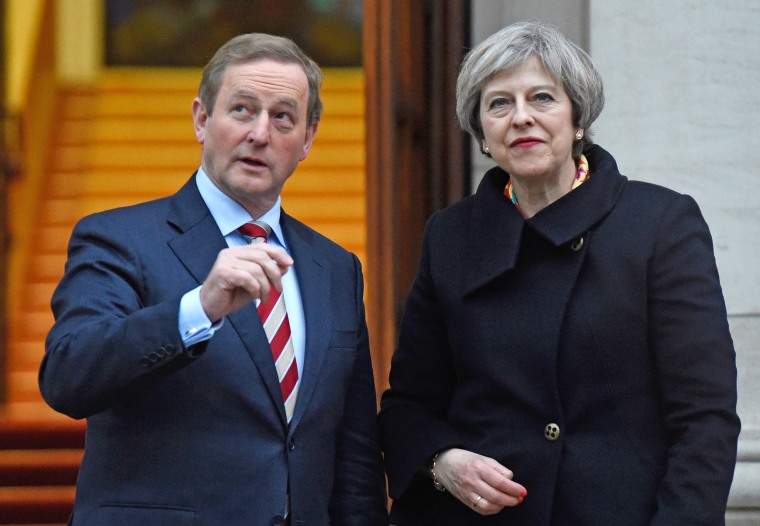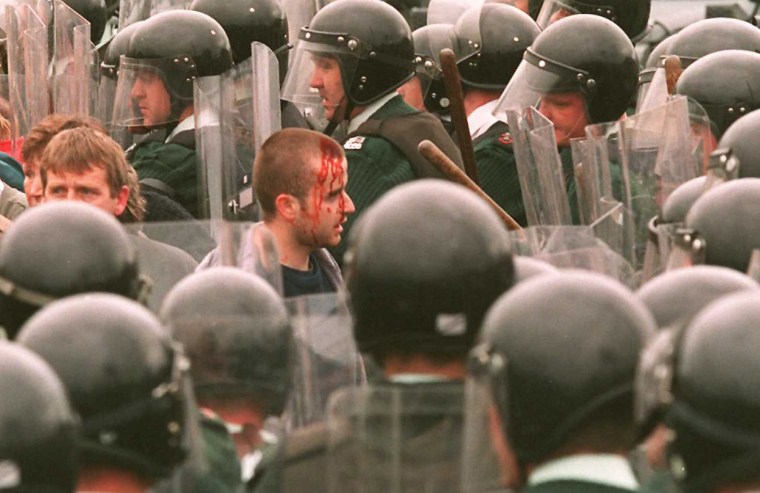LONDON — Northern Ireland's fragile peace process is at risk of collapsing due to British Prime Minister Theresa May's proposed pact to cling to power and push ahead with Brexit, Ireland's leader has warned.
Irish Taoiseach Enda Kenny spoke to May over the weekend, voicing concerns that a pact she's seeking with the hardline Democratic Unionist Party (DUP) would undo progress made since the Good Friday Agreement — a 1998 accord secured with the help of President Bill Clinton.

The Good Friday deal ended decades of bloody conflict in Northern Ireland between people who want remain as part of the U.K. and others backing a united Ireland.
Kenny said he had “indicated … concern that nothing should happen to put the Good Friday Agreement at risk” while Jonathan Powell, a former adviser to Tony Blair, said May’s plan “could undo 20 years of work in Northern Ireland.”
May needs the support of DUP lawmakers to govern after her Conservative party lost its majority in Thursday’s parliamentary election — a humiliating outcome in a vote that was supposed to have given her a stronger mandate during Brexit talks.
"The British government lumping together with the DUP is just rubbing salt into a gaping wound"
However, there is growing concern about the implications of her face-saving move.
In Britain, there are fears that the socially conservative policies of the DUP on issues such as abortion, LGBT rights and the environment are at odds with the majority of U.K. voters.
In Ireland, few see how the British government could remain an impartial guarantor of Northern Ireland’s power-sharing system while simultaneously doing deals with one of the groups involved.
Related: What Does the Democratic Unionist Party Stand For?
Edward Burke, lecturer in strategic studies at England's University of Portsmouth, said: “The whole situation is very worrying. Since the Blair era, a lot of people had broadly accepted that the British and Irish governments could be useful, even productive interlocutors in the Northern Ireland peace process. That’s totally gone now ... The British government lumping together with the DUP is just rubbing salt into a gaping wound.”
A former British government minister for Northern Ireland echoed that concern.
"You've got to be neutral," Peter Hain told the BBC over the weekend. “If the prime minister is dependent on the DUP then all sorts of backroom deals will be done which could impact on the Good Friday process — could put it in jeopardy and could destroy confidence amongst other parties."
The peace process was already in crisis after pro-U.K. and pro-nationalist lawmakers in Northern Ireland’s assembly, at the imposing Stormont building in Belfast, failed to agree on a new power-sharing deal.
As a result of the deadlock, the assembly was suspended for further talks in March. However, those discussions were delayed when May called her snap U.K.-wide election.
Northern Ireland’s latest troubles are yet another constitutional side-effect of Britain’s Brexit vote.
There has long been a so-called “soft border” between Northern Ireland and the Irish Republic, allowing free movement between both parts of the island without showing passports.
However, Britain’s imminent withdrawal from the single market of the European Union — of which Ireland remains a member — has raised the specter of full border controls, risking economic turmoil.
Even the DUP, once a fierce opponent of any peace process, is unlikely to support a hard border, experts say.
Kevin Meagher, a former British government adviser on Northern Ireland and author of “A United Ireland: Why Unification Is Inevitable and How It Will Come About,” believes the DUP will likely adopt a more pragmatic approach to avoid playing into the hands of Irish nationalist opponents, Sinn Fein, led by Gerry Adams.

One group of British loyalists in Portadown, near the Irish border, called on Sunday for the DUP to use its new influence to revisit the issue of historic protestant marching parades in mixed communities that have previously resulted in violent clashes.
The DUP is due to meet with May on Tuesday to discuss the terms of any deal.
“I think the DUP will play its advantage very carefully, focusing on pork barrel sweeteners,” Meagher said, such as agricultural subsidies or lower business tax rates compared to the rest of the U.K. "I don't think the DUP sees any advantage in going back to talking about marches."
He said the party’s uncompromising image was often at odds with its practices in power.
“They have been willing to cut a deal in the past,” Meagher said.
